Crimes of the Heart at UVic Phoenix Theatre. A review.
In 2018, Beth Henley’s southern-based drama Crimes of the Heart (set in small town Mississippi in 1974 and at the University of Victoria Phoenix Theatre February 13-24, 2018) is problematic—on one hand, it’s the story of three sisters bonded through a troubled childhood, on uneasy terms with one another as adults; on the other it’s a fine example of racism so pervasive as to be invisible, not only to the characters themselves, but to the academy that awarded it the Pulitzer Prize in 1981.
Henley herself admits as much, saying in a 2011 interview, “But I think there’s something gripping about being so far behind the rest of the country on so many racial issues. Racism’s always referred to somewhere in my plays—well, not always referred to directly, but often, like in Crimes of the Heart, Babe is having an affair with a black gardener.”
What the author fails to recognize, or even acknowledge (as does every review found online—a point I find particularly troubling), is the gardener in question is a teenager, and in all likelihood, even in 1974, could have faced grievous bodily harm if the “indiscretion” was ever revealed. It’s also the generating plot point of the entire piece; because of this “affair”—which, to be clear, counts in Mississippi as statutory rape, and furthers the stereotypes of the hyper-sexed black man—Babe (Lucy Sharples) has, inexplicably, shot her husband Zachary when confronted.
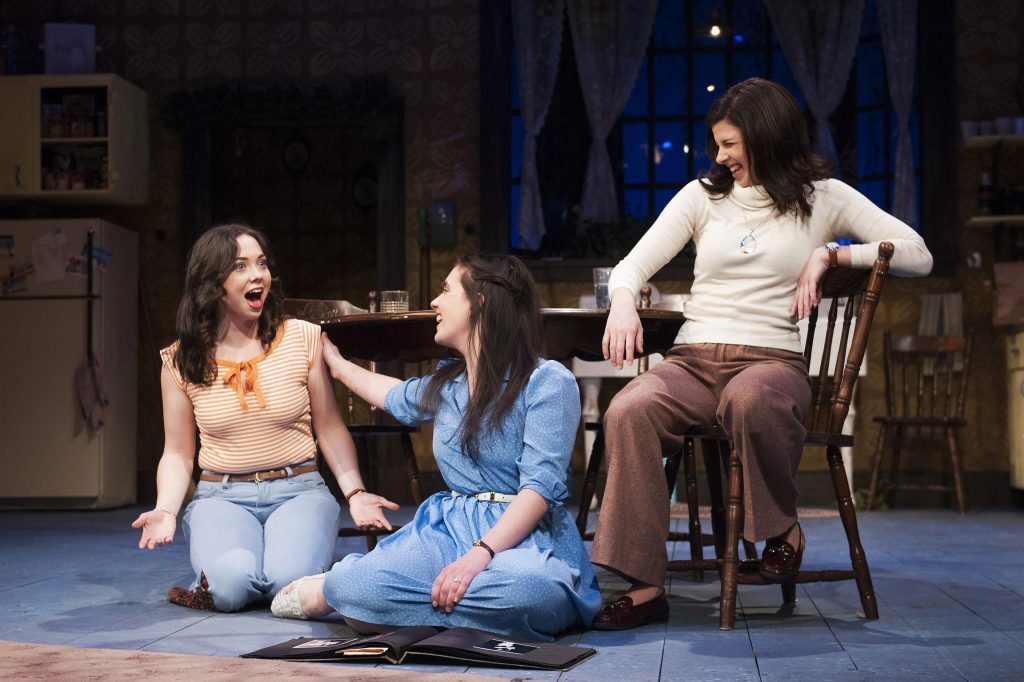
Meg (Sarah Jean Valiquette), Babe(Lucy Sharples) and Lenny Magrath (Sophie Chappell). Photo: David Lowes
It’s any wonder the older sister Lenny (Sophie Chappell) is in a tizzy—Babe’s in jail, she’s trying to reach her middle sister Meg (Sarah Jean Valiquette), off-the-radar in California, and their beloved granddaddy, who she cares for, has suffered a stroke and is in the hospital. Having to deal with cousin Chick (Mary Van Den Bossche plays queen bee dispensing advice with sashaying gusto and a sharp tongue), who shows up trying to rule the roost, doesn’t help. Add in Meg’s old flame Doc Porter (Sheldon Graham has perfected the easy charisma of the former small town shooting star, derailed in his trajectory by one untimely mistake) and an eager beaver young lawyer Barnette Lloyd (Duncan Alexander) and there’s enough drama for several plays.
Director Peter McGuire focuses more on the wacky than the tragic in this quick and lively staging. Perhaps that’s as it should be—the Magrath sisters at times give off the impression of sleep-walking through life, something that is entirely possible if suffering from long-term trauma and PTSD; after all, their momma committed suicide in such a manner as to make national headlines, Lenny is dealing with infertility, Meg’s just finished a stint in the psychiatric ward bringing her hopes of singing stardom to a swift halt, and Babe is, by all accounts, a battered woman.
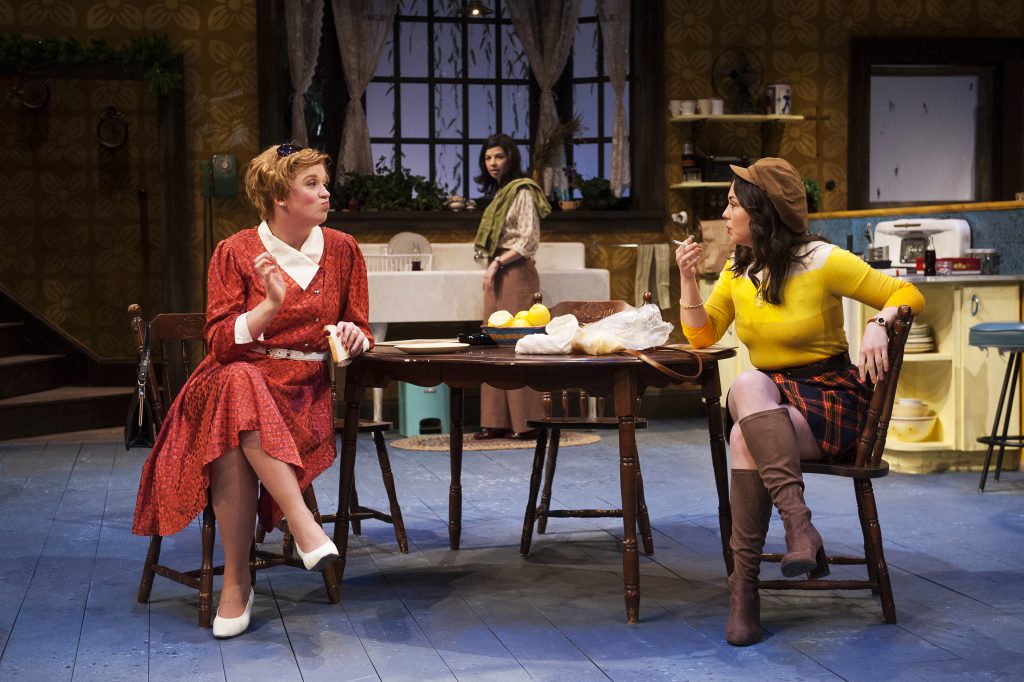
Chick (Mary Van Den Bossche), Meg (Sarah Jean Valiquette) and Lenny (Lucy Sharples). Photo: David Lowes
Through two and a half hours of secrets revealed and troubles averted, they get on one another’s nerves as old patterns surface. Chappell plays Lenny with brusque efficiency, hiding insecurity over her love life, resentful at the lack of attention she receives from her siblings; Valiquette, as Meg, glides effortlessly through the house, bemused at the predicaments and trying to relive her youth with Doc (Graham remains steadfast and unmoved) while Sharples is by turns girlish and morose.
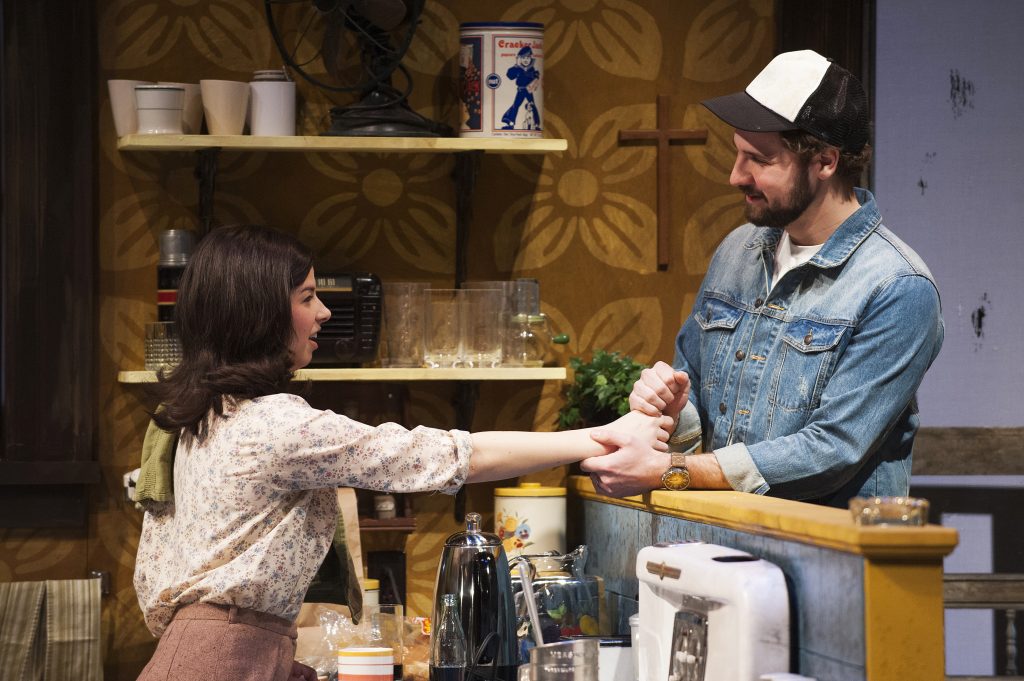
Lenny (Sophie Chapelle) and Doc Porter (Sheldon Graham). Photo: David Lowes
Stefanie Mudry’s set, the kitchen of Granddaddy’s house, is crammed with period-perfect furniture, utensils, vinyl and chrome. Through the window, the graceful boughs of a large tree wave slowly in the breeze; a screen door kerthunks placidly with a sound that evokes an incredible backwash of collective memory. The second story of the house is invoked by a large suspended triangular gable,—complete with cornices and shingles. Madeline Lee’s costumes highlight the difference in styles between free-wheeling California (knee-high boots, short skirt and vivid tight T-shirt) and staid Mississippi (crepe, collared and shirt-waisted dresses). Sound designer Nicholas Atkinson taps into many hits of the 1970s (California Dreaming, Bridge Over Troubled Water, Long Cool Woman) to help re-create the period, and masters night sounds for the play’s quieter moments. Patrick Du Wors’ lighting design truly underscores the dramatic arc as day moves to night and back to day again—pools of grey-blue light in a darkened kitchen make the heart ache.
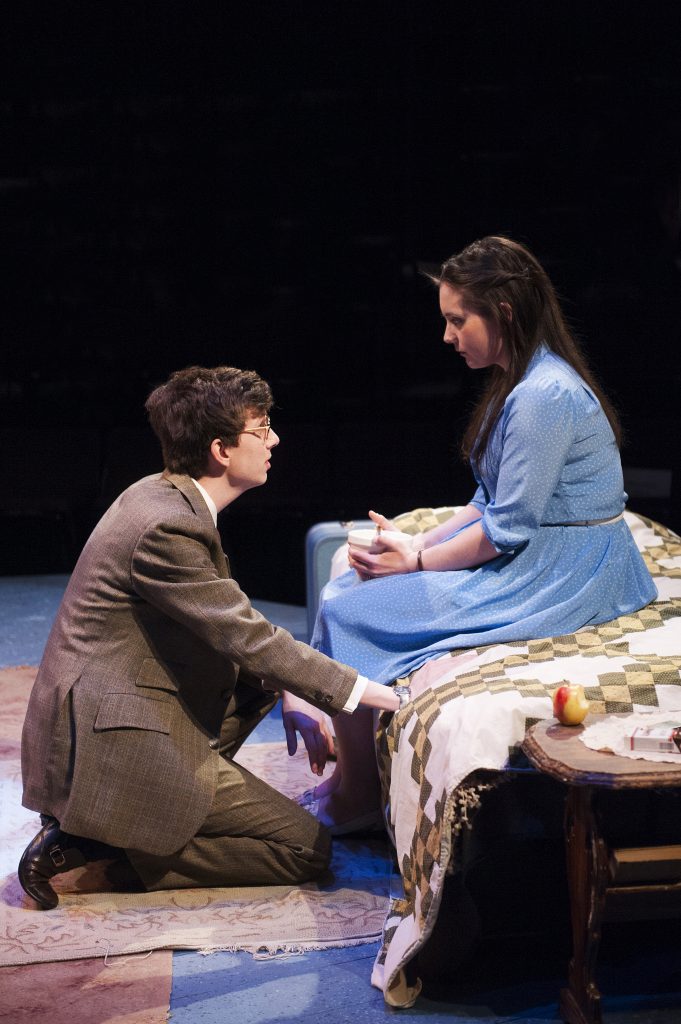
Barnette Lloyd (Duncan Alexander) reassures Babe Magrath (Lucy Sharples). Photo: David Lowes
Hope is never far away—having hastily dispatched the young black man northward, essentially paying him off and averting a pesky crisis, the McGrath sisters can focus on the positive—Lenny’s reconnected with a former boyfriend, Babe’s suicide attempts have failed and Chick’s finally been run off by a seething Lenny in a moment that rings incredibly true. A day late they can still smile and celebrate her dreaded 30th birthday with cake.
Crimes of the Heart is often described as a play about sisterly love with strong roles for women. It should be noted however that in a theatre department comprised of people of many ethnicities, the roles will only be for people who are Caucasian or passing for white. As such, in 2018, is it the best choice?
Thank you to Monica Ogden, actor and creator of Fistful of Feminism, and Ann-Bernice Thomas, actor, and 2016 Victoria Youth Poet Laureate, who brought concerns to my attention and helped me consider this play from another perspective. At a time when perceptions are shifting about many social issues and about frameworks of power and privilege, we owe it to ourselves to hold to a higher standard.
Theatre companies can provide context for work that could be deemed controversial or troubling—excellent examples are Langham Court Theatre who has often scheduled talk-back sessions and panels for shows with mature content and the Belfry Theatre; I still remember a talk-back after Oleanna. Victoria is sheltered, wilfully or not, from the systemic racism of the South—but that doesn’t mean it’s not possible to confront the “elephant in the room”.
Crimes of the Heart tells the story of the Magrath sisters who have grown into adulthood and gone their separate ways: Meg escaped Hazlehurst, Mississippi to pursue her Hollywood dreams; Babe married an ambitious young lawyer; and Lenny remained at their Granddaddy’s side in their family home. After Babe commits a violent crime, the three sisters reunite at home for the first time in years. Hilarity ensues (and a few inappropriate giggle fits) as personalities clash, new and old relationships evolve, and deep wounds are soothed by the tenderness of sisterhood. Humorous and heartfelt, this Pulitzer Prize-winning play beautifully captures the incredible power of family. (Recommended for ages 14+)
“While this play overflows with infectious high spirits, it is also, unmistakably, the tale of a very troubled family. Such is Miss Henley’s prodigious talent that she can serve us pain as though it were a piece of cake.” – NY TIMES
Crimes of the Heart by Beth Henley
University of Victoria Phoenix Theatre
February 13-24, 2018
Tickets: $15-$26. Previews $8.
Box Office: 250 721 8000 or in person Monday to Saturday: 12:00pm – 8:30pm
Director Peter McGuire
Set Design Stefanie Mudry
Costume Design Madeline Lee
Lighting Design Patrick Du Wors
Sound Design Nicholas Atkinson
Dialect Coach Iris MacGregor-Bannerman
Stage Manager Leah Hiscock
Assistant Director Luciana Silvestre Fernandes
Cast
Duncan Alexander Barnette Lloyd
Sophie Chappell Lenny Magrath
Sheldon Graham Doc Porter
Lucy Sharples Babe Botrelle
Sarah Jean Valiquette Meg Magrath
Mary Van Den Bossche Chick Boyle
Disclaimer: I received complimentary tickets to attend Crimes of the Heart.
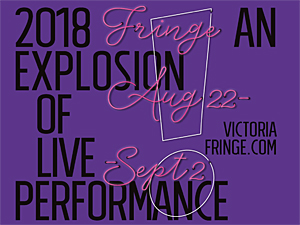


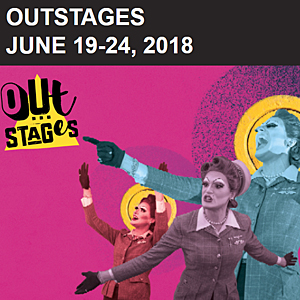
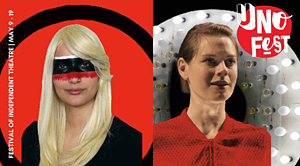
THANK YOU! Someone needed to say it!!!